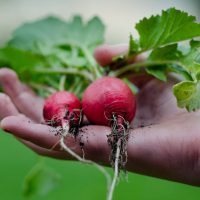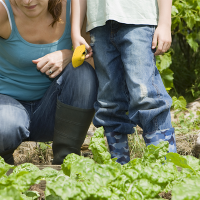Vegetable Gardening for Beginners
There are just so many benefits to growing your own vegetables, first of all it’s great fun, second of all it can save you money and third of all your vegetables will taste fresh and delicious just like they did in the good old days.
More and more people are coming around to the idea of growing their own vegetables but don’t know where to start so here’s where you can start – by reading this guide to vegetable gardening for beginners. Growing vegetables just might be easier than you thought; after all, it’s really not rocket science.
Vegetable Gardening – What to Grow
Don’t get over excited and plant lots of different vegetables, start off small and learn as you go along. If you grow too many vegetables (or too many of the same type of vegetables) the chances are that a lot of them will go to waste which would be a crying shame.
Think about your family and what they will actually eat – alternatively it doesn’t harm to hand over a few tomatoes to the neighbor every now and then, it can give you a real sense of pride.
Remember that vegetables like tomatoes and peppers will keep on supplying you with food for the whole season so you don’t need too many plants. On the other hand carrots, corn and radishes are a “one supply only” so you may need to plant more of them.
Vegetable Gardening – What about Space

You don’t actually need masses of space to grow your own vegetables, you can even grow many vegetables quite successfully in containers.
A well tended garden will provide you with plenty of vegetables – a 10 foot square well tended plot will provide tons more delicious veggies than a 20 foot square plot which has veggies fighting against the weeds.
The Basic Needs of a Vegetable Gardening
Whatever size of vegetable plot you decide upon you must remember that all veggie gardens have three basic requirements.
Full sun – the majority of veggies are sun loving and will need around six or eight hours of sunlight every day for best results – if they don’t get plenty of sunlight not only will you not get as good a crop but they are also likely to suffer from diseases and insect attacks. Leafy vegetables like spinach and lettuce don’t need to be grown in full sunlight and things like peas prefer a little shade if you live in a particularly hot summer climate.
Water – water, water and more water. Vegetables need plenty of water in order to grow so when you plan the location of your vegetable plot remember that it will be much easier for you if it is close to a water source – or if you have a very long hose!
Soil – just like any other plants vegetables do best if they have good soil. The majority of vegetables will do better in well drained, moist soil which has plenty of peat moss or compost in it.
Follow those few basic guidelines and you will be able to look forward to eating delicious home grown vegetables for the whole summer.




